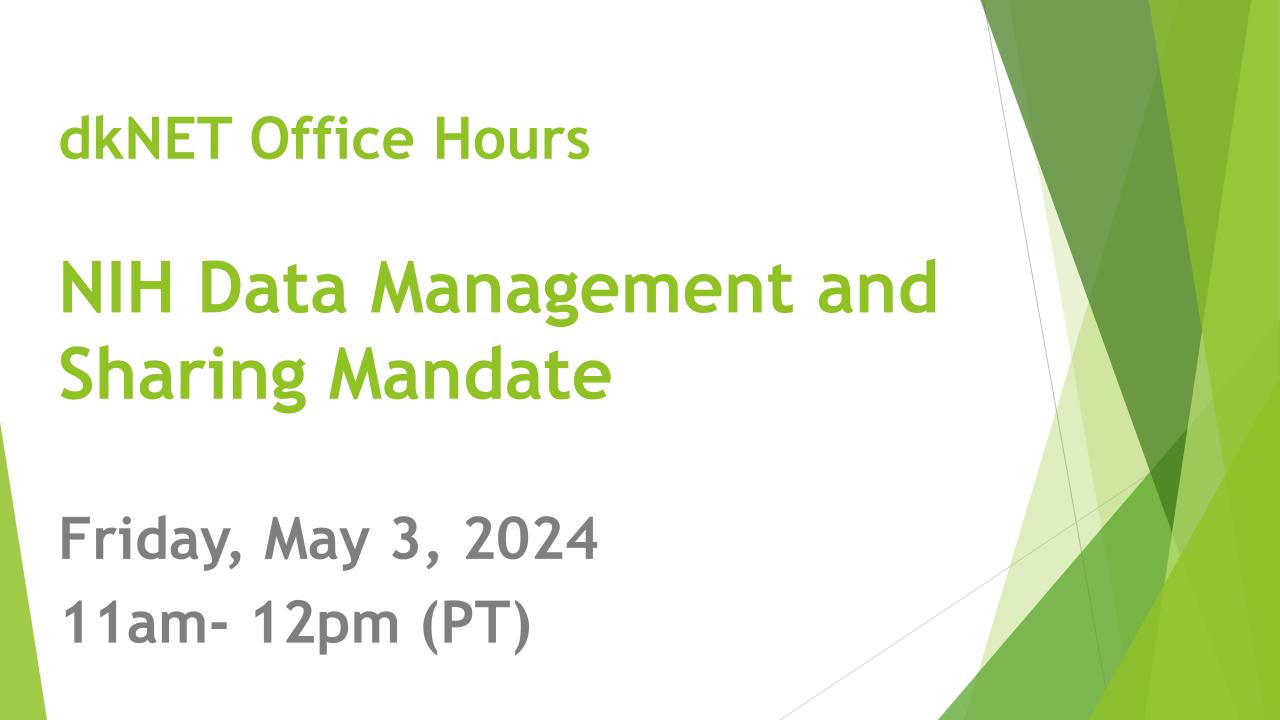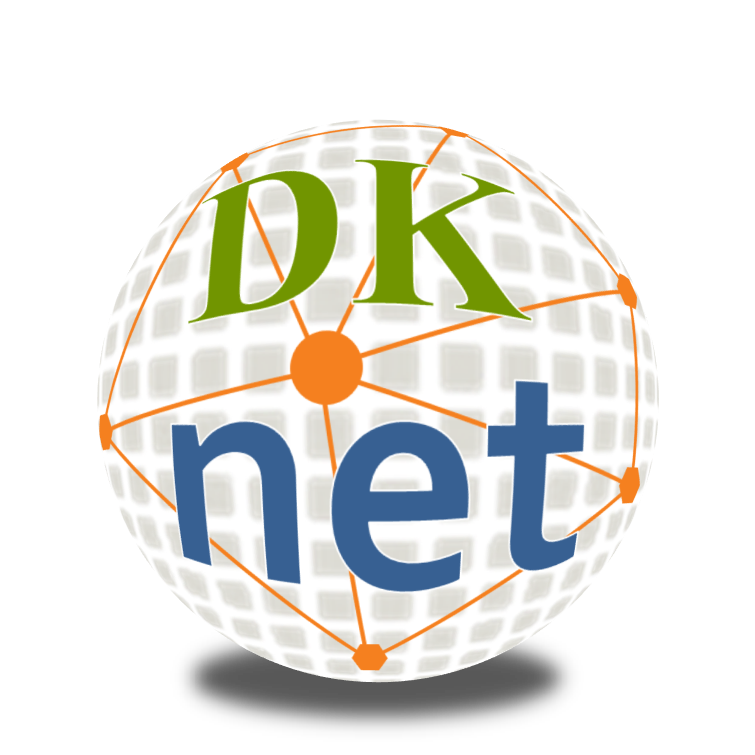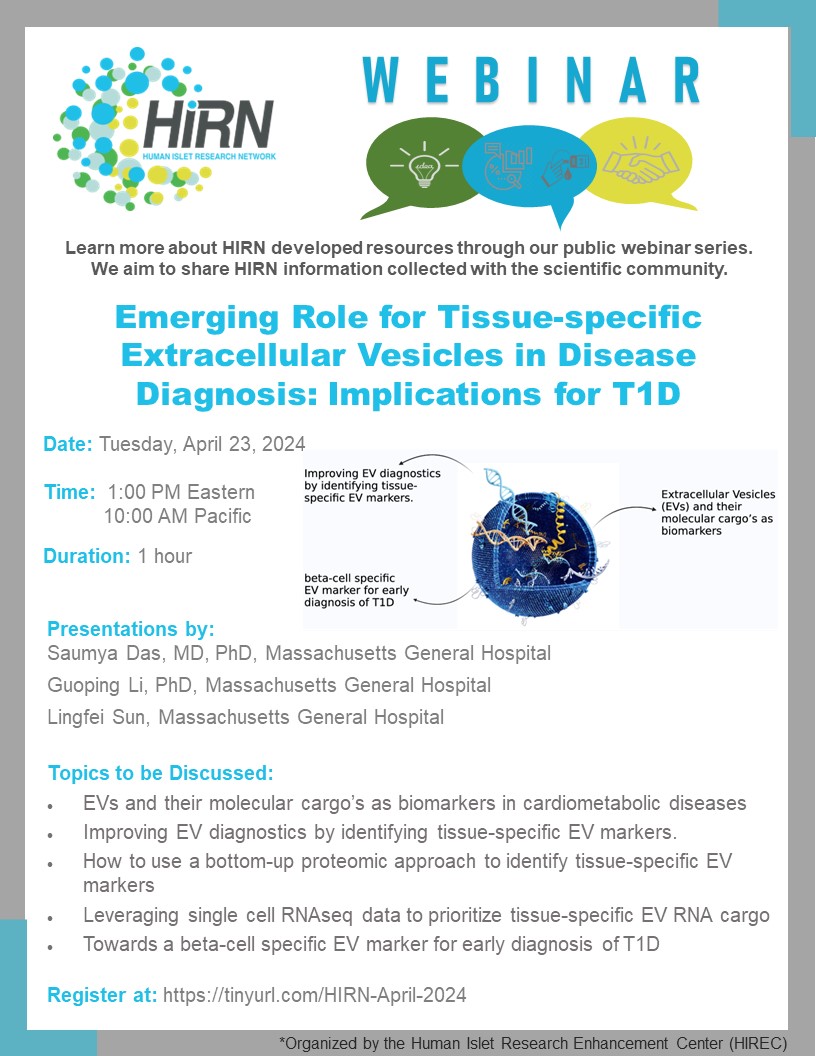Leaving Community
Are you sure you want to leave this community? Leaving the community will revoke any permissions you have been granted in this community.
dkNET community events and announcements in December, 2016
Dear dkNET Community,
dkNET provides updates on activities of interest to the NIDDK-supported community. You could keep up to date on these activities through our Twitter feed @dkNET_info, through our Community Calendar, or through dkNET e-mail list. If you have an event or funding opportunities you'd like to advertise, please contact us info_at_dknet.org.
Events in December, 2016
Dec. 1, 2016
BD2K Open Data Science Symposium
Big Data is an underutilized resource for innovation and discovery in biomedical research and the NIH is committed to unleashing its full potential by making it an open and easily accessible resource. The Open Data Science Symposium will feature discussions with the leaders in big data, open science, and biomedical research while also showcasing the finalists of the Open Data Science Prize, a worldwide competition to harness the innovative power of open data. The Open Data Science Symposium is open to the public and will be available through a webcast.
Location: Bethesda, MD
More information: http://event.capconcorp.com/wp/bd2k-odss/
Dec. 2, 2016
The BD2K Guide to the Fundamentals of Data Science Series: Data Wrangling, Normalization, Preprocessing
Speaker: Joseph Picone, Temple University and Sanda Harabagiu,University of Texas at Dallas
More information: http://www.bigdatau.org/data-science-seminars
Dec. 9, 2016
The BD2K Guide to the Fundamentals of Data Science Series: Exploratory Data Analysis
Speaker: Brian Caffo, Johns Hopkins University
More information: http://www.bigdatau.org/data-science-seminars
Dec. 16, 2016
The BD2K Guide to the Fundamentals of Data Science Series: Natural Language Processing
Speaker: Noemie Elhadad, Columbia University
More information: http://www.bigdatau.org/data-science-seminars
Dec. 19-20, 2016
ILAR Roundtable Microbiome Workshop/Webcast: Animal Models fro Microbiome Research: Advancing Basic and Translational Science
Join the ILAR Roundtable for a free 2-day workshop on December 19-20, 2016 to examine animal models of microbiome research. Invited speakers will discuss challenges of standardization and biological variability in using gnotobiotic model organisms, examine the translatability of preclinical studies to humans, identify alternative model organisms that can be used in microbiome research, and discuss strategies for expanding the infrastructure and tools for conducting studies in these types of models.
Location: Washington, DC, USA
More information: http://us8.campaign-archive2.com/?u=18fe6f8f25ec0bc7509e65e97&id=356f1140d3
Funding opportunities information and deadlines in December, 2016
Dec. 1, 2016
MMPC MICROMouse Funding Application Review Day
The MMPC has set aside an annual budget for small 1 year grants to fund collaborative biomedical research projects between an MMPC and external investigators, or among MMPCs. The MMPCs provide tests on a fee for service basis to characterize many of the mouse models of metabolic diseases that are generated across the country, and therefore are in a unique position to identify opportunities for new or expanded studies as they arise. The focus will be on 1) projects that develop or miniaturize phenotyping tests for use in mice; and 2) research-driven projects that arise from MMPC activities, that combine the interests of two or more investigators, and that fall outside those research activities currently funded by an MMPC or an investigator’s established research program.
More information: http://www.mmpc.org/shared/MICROMouse.aspx
Dec. 5, 2016
Letter of Intent Due Date: NIDDK Exploratory Clinical Trials fro Small Business (R44)
The purpose of this Funding Opportunity Announcement (FOA) is to provide a vehicle for Small Business Concerns (SBCs) submitting Small Business Innovation Research (SBIR) grant applications for investigator-in
More information: http://grants.nih.gov/grants/guide/pa-files/PAR-17-034.html
Dec. 6, 2016
Funding Opportunity Application Due Date: Kidney Precision Medicine Project - Recruitment Sites (UG3/UH3)
This Funding Opportunity Announcement (FOA) requests applications for the Kidney Precision Medicine Project (KPMP) Recruitment Sites (RS) to recruit participants with either acute kidney injury (AKI) or chronic kidney disease (CKD) into longitudinal cohort studies. The RS will collaborate with the KPMP Tissue Interrogation Sites and Central Hub to obtain and evaluate kidney biopsies from participants, create a kidney tissue atlas, define disease subgroups, and identify critical cells, pathways and targets for novel therapies. Applicants should propose to study either AKI or CKD, outline initial cohorts of interest, provide inclusion/exclusion criteria, and estimate recruitment targets given the FOA budget and KPMP objectives. Applicants should have documented experience with patient recruitment and safely obtaining kidney biopsies for clinical and/or research purposes. The initial UG3 exploratory phase will be used to demonstrate that the site can recruit and follow a sufficient number of well-characterized participants with either AKI or CKD, and safely obtain high-quality research kidney biopsies while conforming to the highest ethical, research and clinical standards. UG3 projects that have met their milestones will be administratively considered by the NIDDK and prioritized for transition to the UH3 implementation phase. UH3 awards will support continued recruitment into larger cohort studies. Applicants to this FOA must address both the UG3 and UH3 phases. This FOA is intended to support only human studies and applications that include animal or model systems are not responsive.
More information: http://grants.nih.gov/grants/guide/rfa-files/RFA-DK-16-026.html
Dec. 6, 2016
Funding Opportunity Application Due Date: Kidney Precision Medicine Project - Central Hub (U2C)
This Funding Opportunity Announcement (FOA) requests applications for the Kidney Precision Medicine Project (KPMP) Central Hub (CH) to aggregate, analyze and visualize all participant data and samples and to provide scientific, infrastructure and administrative support for the entire KPMP. The CH will collaborate with the KPMP Recruitment Sites and Tissue Interrogation Sites to obtain and evaluate kidney biopsies from participants with acute kidney injury or chronic kidney disease, create a kidney tissue atlas, define disease subgroups, and identify cells, pathways and targets for novel therapies.
More information: http://grants.nih.gov/grants/guide/rfa-files/RFA-DK-16-028.html
Dec. 6, 2016
Funding Opportunity Application Due Date: Kidney Precision Medicine Project - Tissue Interrogation Sites (UG3/UH3)
This Funding Opportunity Announcement (FOA) requests applications for the Kidney Precision Medicine Project (KPMP) Tissue Interrogation Sites (TIS) to use and develop innovative technologies to analyze human kidney tissue. The TIS will collaborate with the KPMP Recruitment Sites and Central Hub to obtain and evaluate kidney biopsies from participants with acute kidney injury and chronic kidney disease, create a kidney tissue atlas, define disease subgroups, and identify critical cells, pathways and targets for novel therapies. Applicant teams should have documented experience with a current state-of-the-art method that can be used or adapted to interrogate human kidney tissue. The initial UG3 exploratory phase will be used to demonstrate that the site can interrogate existing tissue samples and small numbers of new biopsies. The UG3 phase will also encourage the development of next generation tissue interrogation technologies that probe the structural, functional and molecular complexities of kidney tissue. UG3 projects that have met their milestones will be administratively considered by the NIDDK and prioritized for transition to the UH3 implementation phase. UH3 awards will support further validation, scale-up and technology development. Applicants must address both the UG3 and UH3 phases. This FOA is intended to support only human studies and applications that include animal or model systems are not responsive.
More information: http://grants.nih.gov/grants/guide/rfa-files/RFA-DK-16-027.html
Dec. 12, 2016
Letter of Intent Due Date: Coordinating Unit for the Diabetic Complications Consortium (U24)
The purpose of this FOA is to support the NIDDK Diabetic Complications Consortium Coordinating Unit (DiaComp-CU). The DiaComp-CU will continue to enhance and maintain the DiaComp website, and will provide administrative oversight for consortium meetings and opportunity pool programs.
More information: http://grants.nih.gov/grants/guide/rfa-files/RFA-DK-16-036.html
Dec. 12, 2016
Letter of Intent Due Date: Coordinating Unit for the Mouse Metabolic Phenotyping Centers (U24)
The purpose of this FOA is to support the Coordinating Unit for the NIDDK Mouse Metabolic Phenotyping Centers Consortium (MMPC-CU). The MMPC-CU will continue to enhance and maintain the MMPC website and database, and will provide administrative support needed to enhance MMPC services, meetings, and opportunity pool programs.
More information: http://grants.nih.gov/grants/guide/rfa-files/RFA-DK-16-034.html
Dec. 13, 2016
Funding Opportunity Application Due Date: Microphysiological Systems (MPS) for Disease Modeling and Efficacy Testing (UG3/UH3)
This FOA invites applications for the MicrophysiologiFunds from the NIH will be made available through the UG3/UH3 cooperative agreement award mechanism. The initial UG3 phase will support studies to develop in vitro disease models using tissue chip technologies and iPSC and/or primary tissues derived from patients, and functional validation of the models. The UH3 phase will support studies to demonstrate the functional utility of the disease models for identification of novel treatment mechanisms through better understanding of disease biology, drug screening, assessment of candidate therapies for efficacy and safety assessments, and establishing the pre-clinical foundation that will inform clinical trial design. A UG3 project that meets its milestones will be administrativel
More information: http://grants.nih.gov/grants/guide/rfa-files/RFA-TR-16-017.html
Dec. 14, 2016
Funding Opportunity Application Due Date: NIDDK Inflammatory Bowel Disease Genetics Consortium (IBDGC) Genetic Research Centers (GRCs) (U01)
The NIDDK Inflammatory Bowel Disease Genetics Consortium (IBDGC) was established in July, 2002 for the purpose of identifying genes predisposing to IBD. Since its establishment, the IBDGC, in collaboration with the International IBD Genetics Consortium, has identified about 200 such susceptibility loci. However, most of these loci include multiple genes, and for the great majority of the loci, specific causal genes and alleles have not yet been identified. The mechanisms by which the most of the causative genes influence IBD pathophysiology also remain unknown. The purpose of this FOA is to renew the IBDGC to identify risk-conferring and protective variants of causal genes for IBD, and to elucidate the mechanisms by which these variants influence the pathophysiology of IBD. The GRCs will serve as sites of enrollment of IBD patients, relatives, and healthy controls for these studies, and for laboratory-base
More information: http://grants.nih.gov/grants/guide/rfa-files/RFA-DK-16-029.html
Dec. 14, 2016
Funding Opportunity Application Due Date: Limited Competition for the Data Coordinating Center (DCC) for the NIDDK IBDGC (U24)
NIH NIDDK funding opportunity: Limited Competition for the Data Coordinating Center (DCC) for the NIDDK Inflammatory Bowel Disease Genetics Consortium (IBDGC) (U24). The NIDDK Inflammatory Bowel Disease Genetics Consortium (IBDGC) was established in July, 2002 for the purpose of identifying genes predisposing to IBD. Since its establishment, the IBDGC, in collaboration with the International IBD Genetics Consortium, has identified about 200 such susceptibility loci. However, most of these loci include multiple genes, and for the great majority of the loci, specific casual genes and alleles have not yet been identified. The mechanisms by which the most of the causative genes influence IBD pathophysiology also remain unknown. The purpose of this FOA is to renew the IBDGC to identify risk-conferring and protective variants of causal genes for IBD, and to elucidate the mechanisms by which these variants influence the pathophysiology of IBD. The DCC will coordinate collaboration among the Genetic Research Centers (GRCs, described in the companion FOA RFA-DK-16-029), enrollment of subjects into the study, submission of blood and other biological samples to centralized repositories, processing of blood samples for extraction of DNA and isolation of cells and serum, submission of clinical, genetic, and molecular data to central databases, and analyses of data, and manage the operations of the Steering Committee and other operational committees. The DCC will also coordinate the development of pilot projects for rapid follow-up of emerging findings by members of the IBDGC and external collaborators. In addition, the DCC will coordinate the collaboration of the IBDGC with the International IBDGC, and with other external investigators conducting ancillary studies. The PD/PI of the DCC shall serve as a voting member of the Steering Committee of the IBDGC, and be bound by all of the operational decisions of this Committee.
More information: http://grants.nih.gov/grants/guide/rfa-files/RFA-DK-16-510.html
Dec. 15, 2016
Funding Opportunity Application Due Date: Big Data to Knowledge (BD2K) Enhancing the Efficiency and Effectiveness of Digital Curation for Biomedical Big Data
The purpose of this BD2K Funding Opportunity Announcement (FOA) is to support the development, improvement and implementation of tools and approaches that increase the efficiency and effectiveness of digital curation processes used to characterize and describe the digital data used in or resulting from biomedical research.
More information: http://grants.nih.gov/grants/guide/rfa-files/RFA-LM-17-001.html
Dec. 16, 2016
Decamp Collaborative Funding Program Q&A Webinar
Q&A Webinar on DiaComp Collaborative Funding Program:Diabeti
More information: https://www.diacomp.org/shared/collaborative.aspx
Dec. 31, 2016
Funding Application Due Date: Genotypic and Phenotypic Data related to Nonalcoholic Steatohepatitis (NASH), Diabetic Nephropathy, Type 2 Diabetes and Complications for Incorporation into the Type 2 Diabetes Knowledge Portal
The Foundation for the National Institutes of Health (FNIH) has released three new funding opportunities that aim to add to the growing body of data housed in the T2D Knowledge Portal. The new Request for Proposals (RFPs) solicit data on T2D related complications and individual level and whole exome sequencing data related to T2D. FNIH awards will provide successful applicants with up to $200,000 per individual award for proposals to harmonize and transfer existing datasets and up to $500,000 per individual award for proposals that include the generation of new genotyping data. Awards will be made over two years and aim to enhance the NIH-funded T2D Knowledge Portal hosted by the Broad Institute at the Massachusetts Institute of Technology (MIT).Responses to the FNIH Requests for Proposals are due by December 31, 2016.
More information: http://fnih.org/what-we-do/current-research-programs/amp-t2d-project





